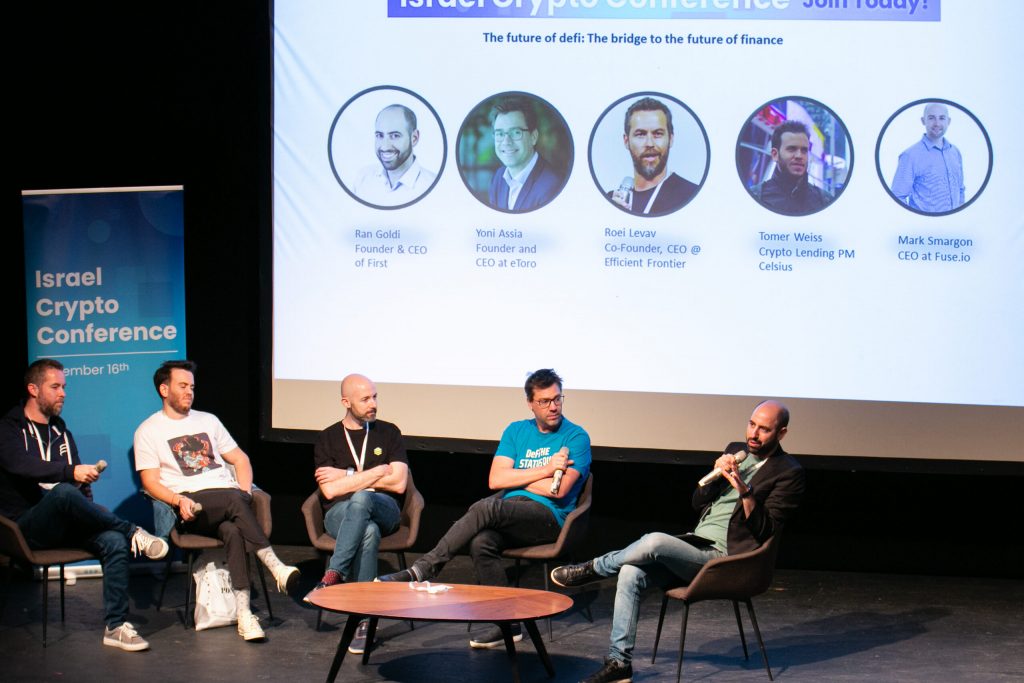Israel Crypto Conference Overview – BeInCrypto

BeInCrypto is proud to be a media partner of the Israel Crypto Conference, held in Tel Aviv on December 16, 2021, with over 650 attendees in a sold-out event.
The crypto sector has experienced significant growth over the past two years, zooming from a $200 million valuation to more than $2.9 trillion. This growth is based on four major factors.
Institutional funds adopted Bitcoin and the decentralized economy, the development of decentralized finance – DeFi – more applications, more technology, and more users than ever, the launch of super speedy smart contracts like Solana alongside scalability solutions for Ethereum like Polygon, Arbitrum, and Optimism.
And the adoption of smart protocols enables NFTs to engage with art and games.
On December 16, 2021, the Israel Crypto Conference was held in Tel Aviv with more than 650 attendees in a sold-out event.
The event brought leading crypto tech and we talked with them about the eco-system, Israel has become a major player in creating technology for the crypto industry.
A conversation with Mark Smargon, CEO at Fuse.io
What was the key issue Fuse wanted to solve, when you started?
Mark: We started Fuse in 2019 after making several steps in the blockchain world since 2013. We felt Fuse was needed because the technology was exciting but no one focused on applying it to non-technical users or investors. We believe that in the future people will use open-source permissionless technology behind the scenes of our daily lives.
It’s hard to see today because the technology is new but applying it to use cases like payments is something badly needed especially in places that use mostly paper cash. Fuse wants to build a payments infrastructure that is borderless and provides lower entry barriers to consumers and merchants and also for the companies that operate those services.
What do you see at the next big push in development in the crypto space? What are people building?
Mark: We are excited to see more and more “sharing economy” business cases that exist around the world like Uber, Airbnb, Deliveroo, etc. start seeing more and more alternatives that are smaller and more local but also charge much less percentage from the merchants.
We believe that the internet is not finished to disrupt those industries and with Fuse technology behind the scenes, users would be able to do everyday stuff like order food delivery or list an item on a second-hand marketplace without paying an intermediary 30%.
Quick chat with Nimrod Lehavi Founder & CEO Simplex
Why is the work your company does important for adoption?
Nimrod: Simplex aims to change the status quo of the current crypto markets by providing a simple, seamless, and secure solution to convert over 110+ fiat currencies to 100+ cryptocurrencies. We empower our partners to offer the widest range of payment methods to their users, including Visa, MasterCard, Apple Pay, SWIFT, SEPA, as well as enable users to spend their crypto earnings in the traditional way – withdrawing from ATMs, online payments, in-store shopping, etc.2.
What is the biggest issue holding back crypto adoption, from your perspective?
Nimrod: It’s still a common notion that crypto is far too complicated for the average person to use or understand, and part of Simplex’s mission is to change that with an even more streamlined UX for anyone joining the growing crypto ecosystem. We intend to drive adoption further by supporting our partners’ users with every possible payment method, increasing auth rates, and driving transaction costs to the minimum.
Asaf Orpani, Founder & CEO at Arkhivist shares his vision
Tell us why you started Arkhivist.
Asaf: While I was working as a security researcher at a web security company, I spent a lot of time maintaining the Web Application Firewall. A real-time anomaly detection technology like a firewall was something I considered a commodity. When diving into the DeFi world, it came as a shock to me that no such technology was implemented and so it was the first thing I began working on.
How do you balance responding to threats and customer autonomy? Is it viable to get a customer to approve fund protection in the time a threat is noted by your platform?
Asaf: This is a great question since it’s a matter we pay a lot of attention to. Together with our early customers, we are working hard to understand how the policy should look like regarding when to exfiltrate funds or let them be. I noticed that in the crypto native funds out there, big or small, the approach is “better safe than sorry”.
It’s better to let the platform automatically exfiltrate funds when it suspects something bad is about to happen. Even if it was a false alarm, you can always put your money back to work.
Can you tell us why carbon-negativity with your blockchain was important when building Algorand? and what will sustainable blockchains become more important as the space builds?
Asaf: Algorand was built as a green blockchain with an environmental impact focus from the very beginning. Algorand founder Silvio Micali explained as far back as 2018 his focus on sustainability for our planet with next-generation technology. With his unique consensus mechanism, Algorand is far more energy-efficient than other blockchains and is going further by offsetting its small carbon footprint in partnership with ClimateTrade.
“While some blockchains consume as much energy as a small country, Algorand consumes as much as 10 homes. Being green is our pride and our moral obligation. The less privileged are the first to suffer from the degradation of the environment – a blockchain that is bad for the environment is a bad blockchain. Period,” said Silvio Micali in a recent keynote.
“Our team looks at the big picture and everything we do is focused around creating long-lasting, enduring value. Therefore sustainability is key – from a technical perspective, business perspective and environmental perspective,” says Shamir Ozery, Marketing Programs Director at Algorand.
Disclaimer
All the information contained on our website is published in good faith and for general information purposes only. Any action the reader takes upon the information found on our website is strictly at their own risk.














